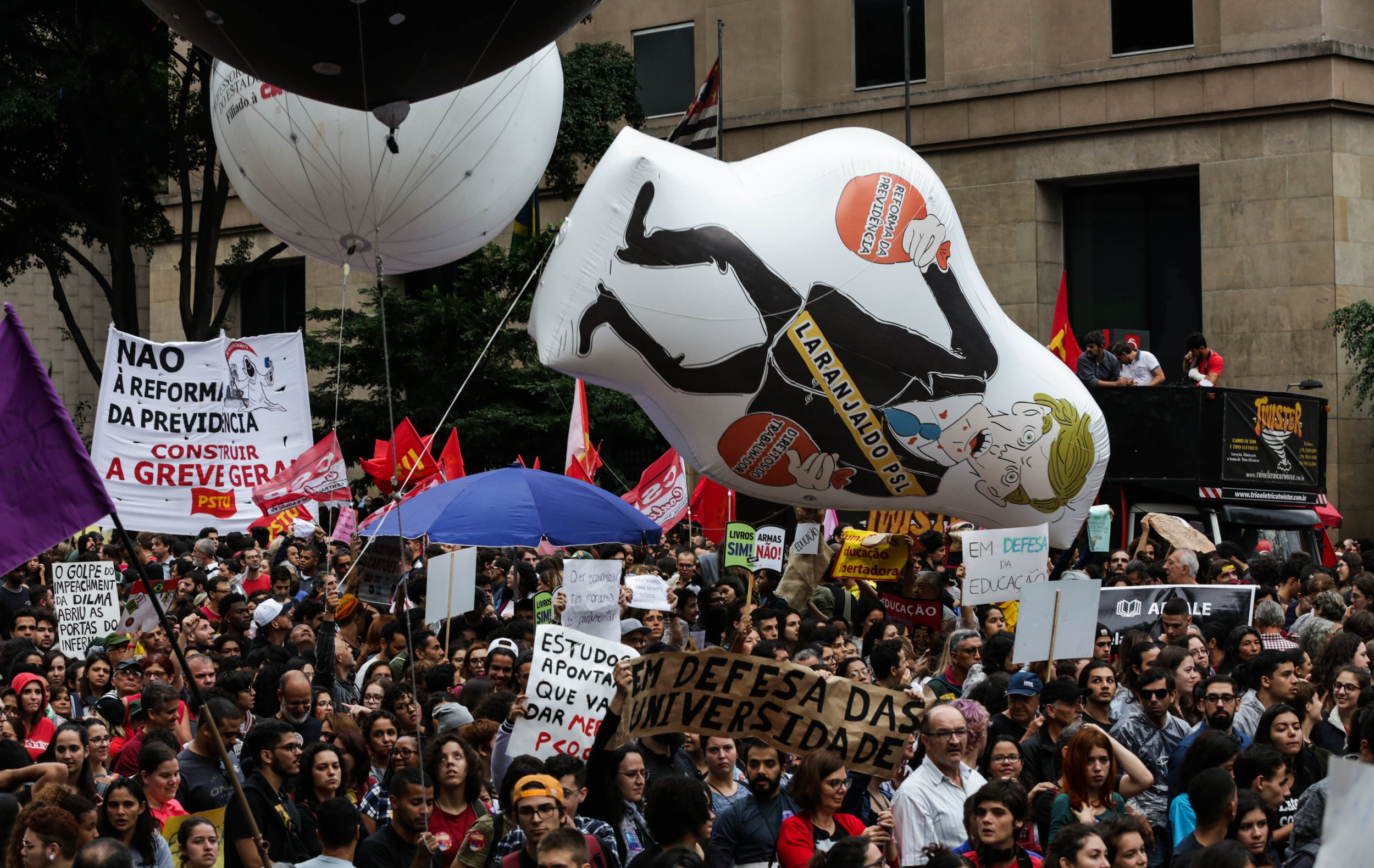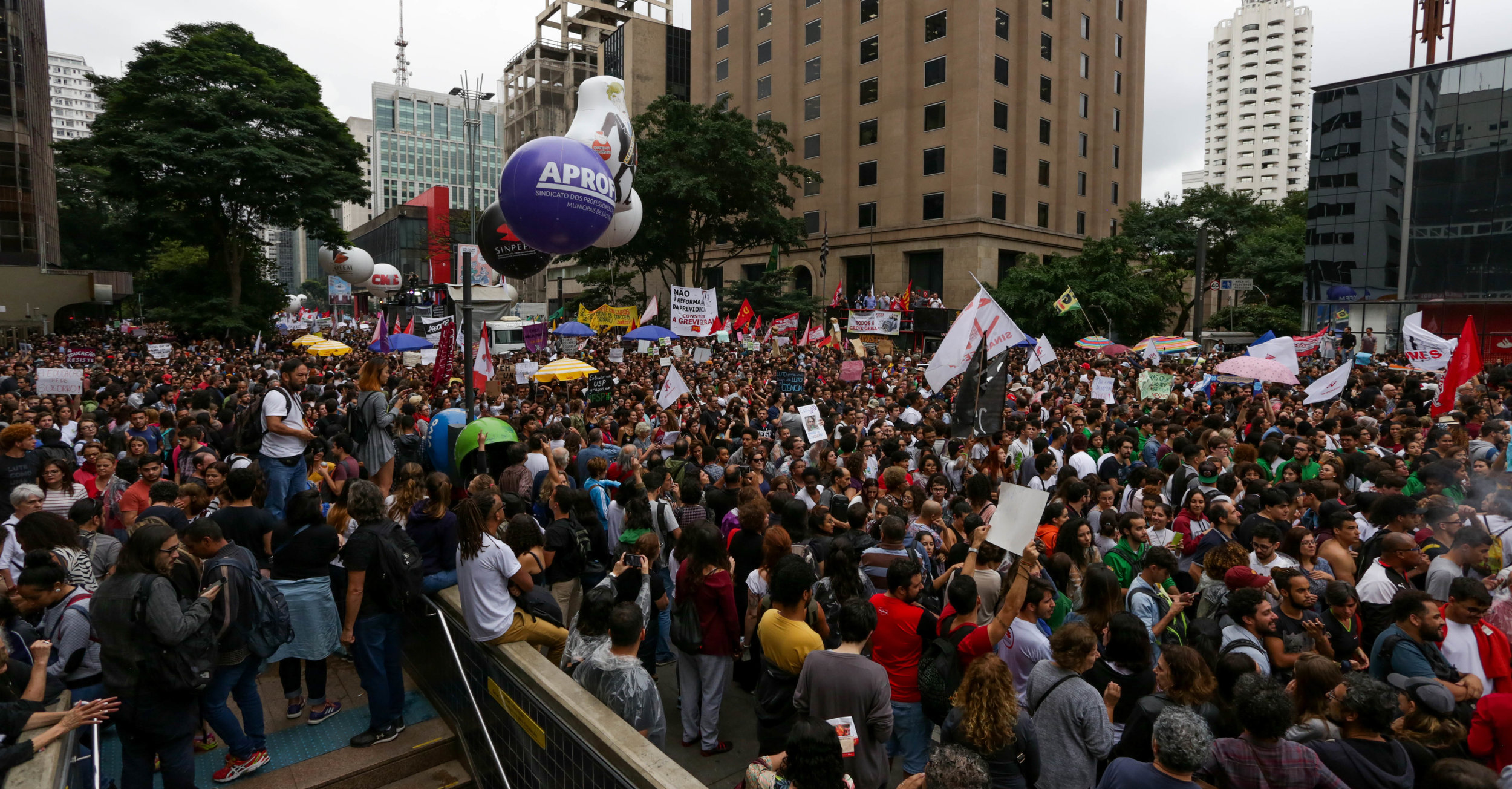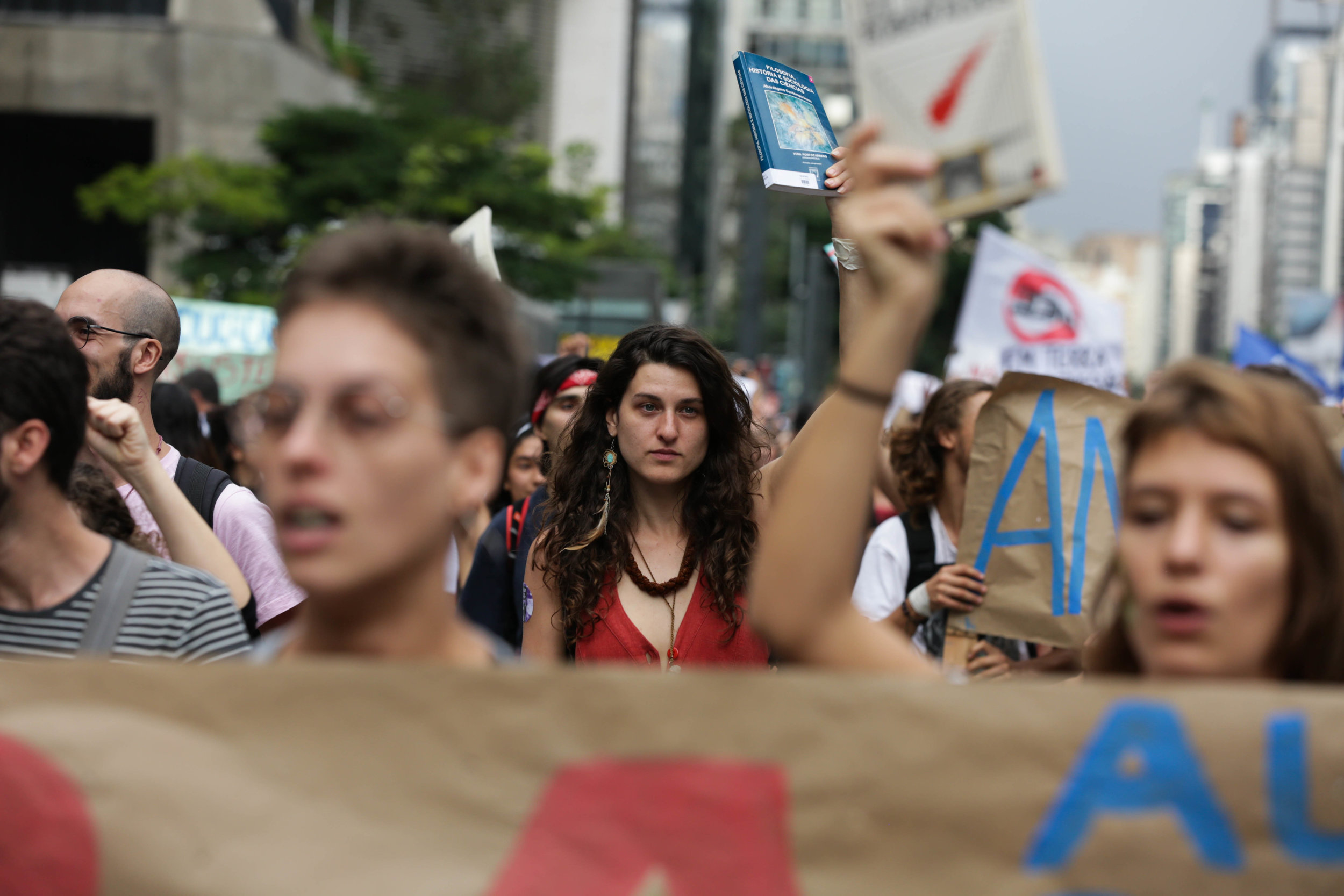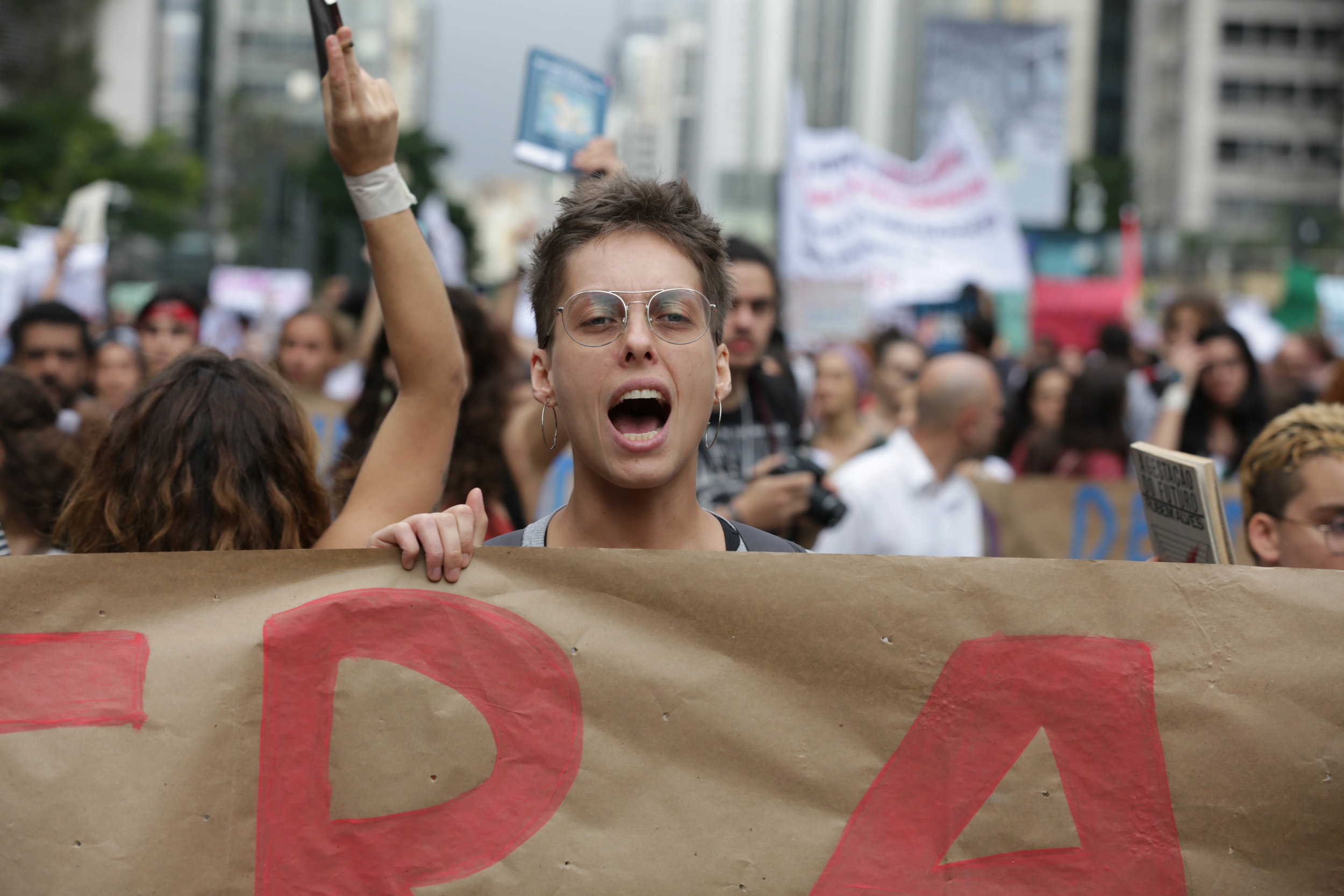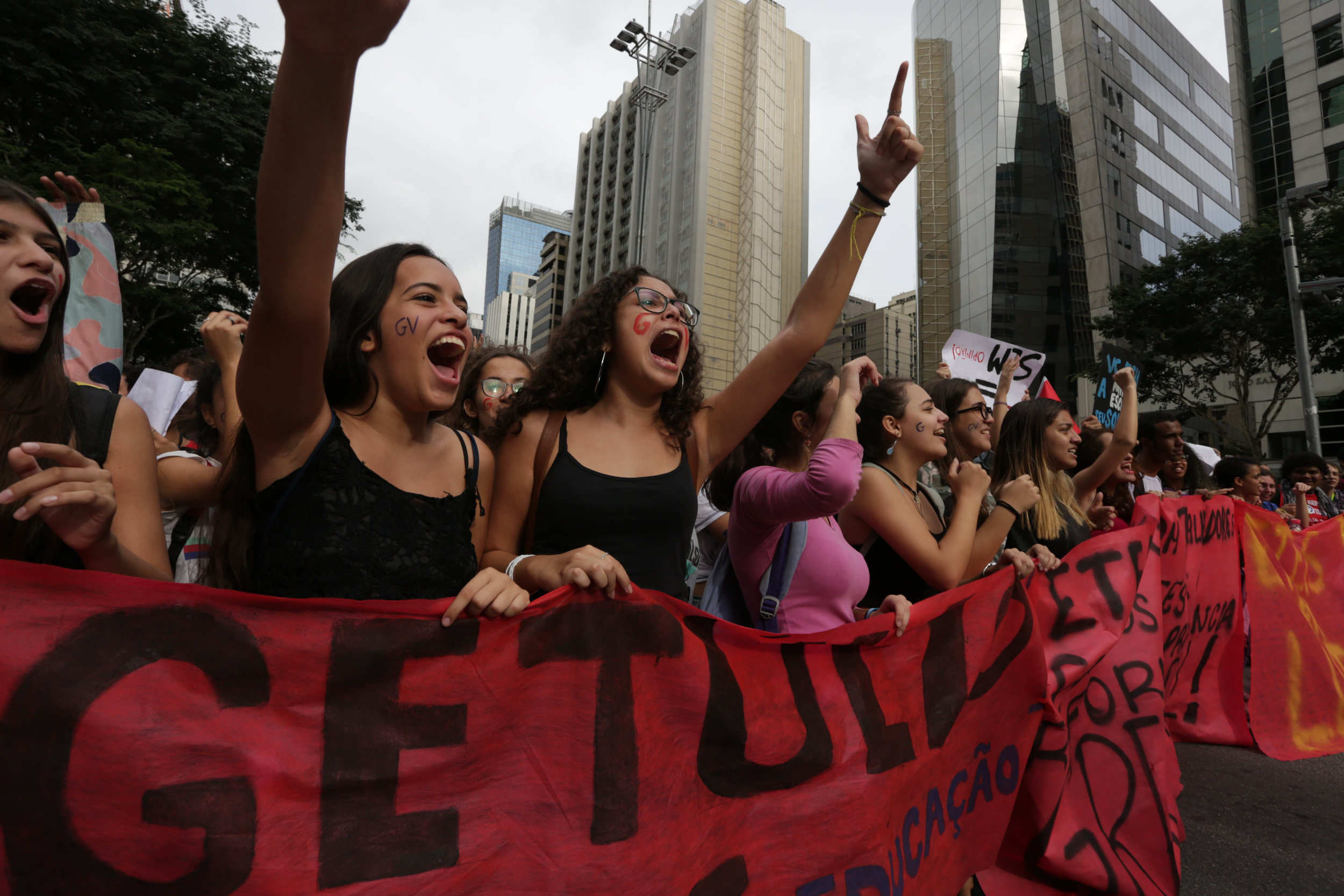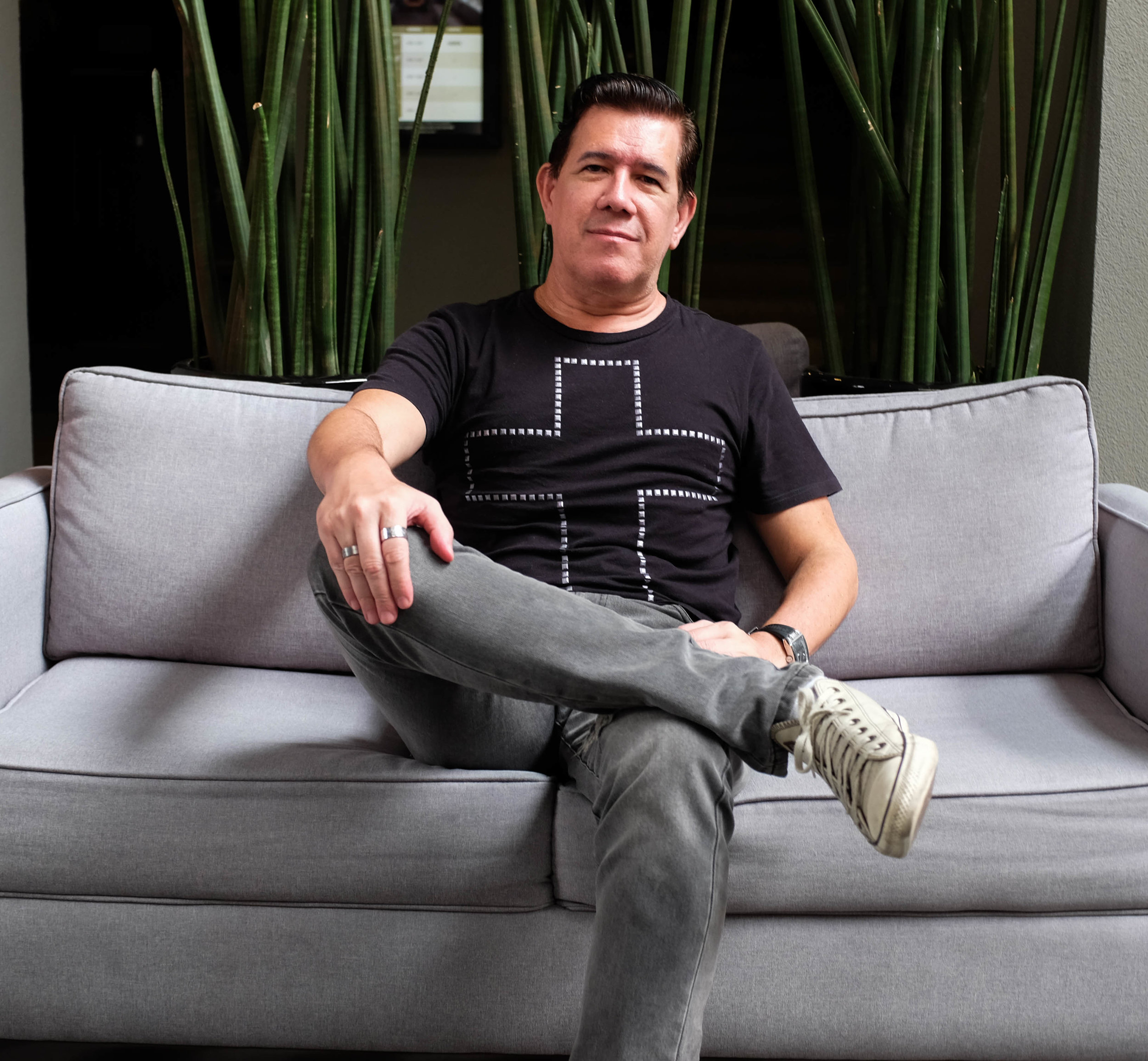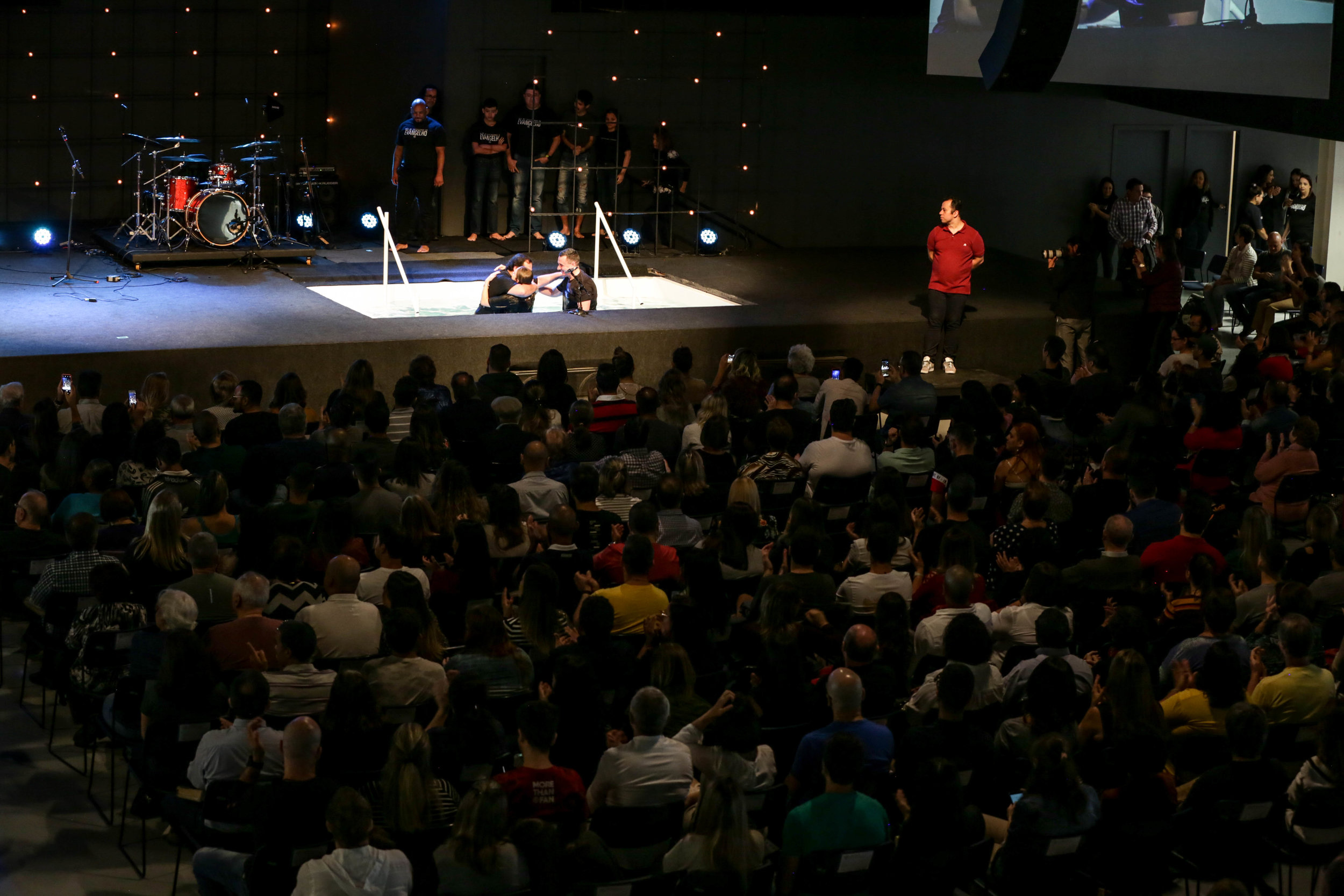Are Brazilian Christians who elected Bolsonaro losing faith in him?
Photo by Wesley Parnell.
SÃO PAULO, Brazil — Protestors of all ages arrived from around the city, marching, dancing and chanting their way up Paulista Avenue, a main thoroughfare in São Paulo. “Get out Bolsonaro,” they chanted. They held signs reading, “my weapon is my education,” and “in the fight for social rights.”
Tens of thousands of students, teachers and citizens took to the streets in May to protest government budget cuts in education. Brazil’s National Student Union organized the protest, one of more than 100 nationwide, in response to the federal education administration cutting discretionary spending by a third. Brazil has 209 million people under age 40, and roughly 60 million are enrolled in a school of some kind. The budget trims were part of reforms by the new president Jair Bolsonaro, who took office in January.
The protests marked the end of Bolsonaro’s honeymoon with the electorate and the first nationwide protests on his five-month-old administration, which is seeing poll numbers sliding as he battles an economic slump, rising unemployment, political headwinds in Brazil’s Congress and new questions from some in his base of Christians — Catholics and Protestants — who helped elect him.
“He is like a marionette puppet. He uses Christianity to be famous and for people to believe in his extremist ideas,” said Isabela Meniz, a student at Mackenzie Presbyterian University in São Paulo, who marched in the May protest. “We don’t have to vote for a guy who is racist and prejudiced. We can do this together. We don’t have to vote for extremist candidates. They use religion to take the stage.”
Bolsonaro’s approval ratings fell 16 percentage points between January and March to just over 50 percent, according to a poll released by Ibope Inteligencia. The survey indicated 38 percent of Brazilians disapprove of his presidency. Another poll by Datafolha in April showed only 42 percent of evangelicals said Bolsonaro’s government is doing a “good” or “great” job even though Bolsonaro received 69 percent of the evangelical vote in October.
His administration has yet to tackle his key campaign proposal to reform Brazil’s bloated pension system. Brazil’s economy is the largest in Latin America and one of the hottest in the world in the past two decades with GDP growth at 7.53 percent in 2010, before dipping to negative growth between 2015-2016 and remaining at less than 2 percent annual growth since 2017. Meanwhile, nationwide unemployment has risen from 11.6 percent last December to 12.7 percent in April.
Photo by Wesley Parnell.
Religion as a fragile but large voting bloc
Bolsonaro has managed to duct-tape an alliance of Christian voters by his rhetoric and symbolic acts such as getting baptized in the Jordan River during a trip to Israel two years ago. His campaign staff made videos featuring celebrity pastors, designed to draw in Christian voters. His nationalist campaign slogan was even “Brazil before everything and God above all.”
Catholics now make up 55 percent of Brazilian voters, and they split their votes evenly between the left and right parties, according to Datafolha. Meanwhile, evangelical support for right-leaning candidates such as Bolsonaro rose to 70 percent in 2018, up from 50 percent in 2014. Brazil was 92 percent Catholic back in 1970, but today 30 percent of the population over age 16 identifies as evangelical.
Bolsonaro capitalized on overall citizen anger about corruption in government, economic malaise and violent societies. Voters, particularly religious voters, were willing to move away from liberation theology, which has historically animated Catholic populations in Latin America. The Christian community wanted a law and order candidate.
And when Bolsonaro was stabbed and campaigned from the hospital, many religious people had compassion on him and appreciated his resilience.
But a Christian left is becoming more active and is concerned about Bolsonaro’s negative comments about women, black people and LGBT people. His minister of women, family and human rights is an evangelical pastor and attorney named Damares Alves. In a video from an election party, Alves said she and Bolsonaro would bring in a “new era” in which “boys wear blue and girls wear pink.”
In a pushback last week, Brazil’s Supreme Court ruled that homophobia is a crime akin to racism. Bolsonaro, who has previously said he “would be incapable of loving a homosexual son” and would rather his son die than bring a male lover home, called the court’s decision “completely wrong.” He wants to appoint an evangelical judge to balance out the highest bench.
Bolsonaro also once said a political rival, Maria do Rosário, is “not worth raping.” He has described the United Nations as “a bunch of communists.” He has referred to immigrants as “scum.” He believes in arming citizens, torturing drug dealers, using firing squads to kill criminals and stepping up an aggressive police force.
Some evangelical leaders were more supportive of a worker’s party (PT) candidate named Fernando Haddad. Meanwhile, a Catholic-evangelical alliance calling itself “Love Defeats Hate Christian Collective,” led by Flavio Conrado, has been staging marches in several major cities.
Visit to church with Sergio
To find the Igreja Batista de Água Branca church in the West Zone of São Paulo, you have to drive past a set of warehouses on a gravel road and pull up to a former call center where cars are parked in every spare alleyway and parking lot.
Igreja Batista de Água Branca church in São Paulo. Photo by Wesley Parnell.
“A businessman who lost the telemarketing business now attends the church,” says Sergio Pavarini, a social media influencer and a former executive in Christian publishing in Brazil. “He lost everything. But now he is happy of the new purpose for the building.”
As you walk in, the church is packed wall to wall with 1,500 people at its 11:30 a.m. service, one of three happening that day. People are standing in the back, scanning the sanctuary for an open seat.
The church is 90 years old but was always a small church until about 15 years ago when it ballooned toward 6,000 members with 3,000 or more other people watching services online from around Brazil as well as Portuguese speakers from other countries, who consider the church their home church.
Sergio Pavarini, a social media influencer and a former executive in Christian publishing in Brazil. Photo by Wesley Parnell.
Paravini says Sao Paulo has several churches like this in its North, South, East and West regions.
A baptism soon begins amid a repertoire of praise songs. One woman baptizes her husband. Another woman baptizes her nephew. A woman baptizes her boyfriend. The congregation sings more praise songs. New members stand and are hugged. A dozen or more people are baptized.
A black man who is deaf climbs into the baptismal pool and professes his faith in Christ through sign language. Thousands of people in the service wave their hands in glad hands style — a visual clap for him. The pastor dunks him and when he re-emerges from the water, the audience give another glad hands wave.
A baptism at Igreja Batista de Água Branco church in the West Zone of São Paulo. Photo by Wesley Parnell.
A woman almost dropped a teenage boy into the water. The audience laughed. He asked to be baptized a second time, “again!” He said in Portuguese. Another pastor obliged. The crowd laughed. The baptisms continued with hugs and joy.
“130 new members this month,” Sergio says. “Every service once a month, 20 people are baptized.” That’s 60 a month across three services.
The church is sending a couple with two children, their father a doctor, as medical missionaries to Africa. This church supports 34 projects in Africa – mostly in Portugal’s former colonies of Mozambique and Angola – with money for health clinics, disaster relief and development projects. So one former Portuguese colony is providing humanitarian support and missionary work to other former Portuguese colonies.
Ed René Kivitz, senior pastor of Igreja Batista de Água Branco. Photo by Wesley Parnell
The pastor is Ed René Kivitz, one of the most influential pastors in Brazil. He has written several books, published and written articles for several newspapers and magazines, including Veja, the main publication in the country.
His sermon was about the difference between religion and the Gospel and how religion makes us selfish while the gospel makes us more equal before God. “We have to build the bridge and not fight against each other,” he says. “God calls us to build bridges and to serve people.”
Sergio says the pastor is a bridge-builder because he has small groups for big entrepreneurs-- businessmen. Some famous Brazilian actors and actresses visit the church, but the pastor doesn’t identify them or treat them differently than other parishioners. “He teaches the Gospel and shares the Bible with very well-known people. He is very discrete,” Paravini says. “He doesn’t brag about that. Doesn’t post pictures with someone famous.”
A guy plays a jazz acoustic version of “What a friend we have in Jesus.” The song leader is Paulo Cesar Baruk, a known singer in Brazil who has 700,000 followers on social media. The church and Pastor Ed have about 500,000 followers on Twitter.
Why Christians are questioning Bolsonaro now
Driving to lunch after church, Paravini reflects on the strange moment in Brazilian politics and public life. He estimates 70 percent of the people attending the Igreja Batista de Água Branco church are against Bolsonaro while 30 percent support him.
Paravini noted that Bolsonaro used John 8:32 – “The truth will make you free” – during his campaign. He also used “God over everything” as a motto. “So Christian people used to support him. They analyzed him and his wife as Christians. They hoped he would put their principles over the country.”
But Bolsonaro’s sons, working in politics and under suspicion in at least one corruption probe, have also frayed Christians’ trust in the president.
Paravini says he believes Christians – both Catholics and Protestants – appreciate Bolsonaro’s traditional policy defenses of families and children. But he thinks they are uncertain about Bolsonaro’s enthusiasm for guns as a way to stop crime. “A lot of Christian people don’t believe the politics on guns is a Christian belief and they are reacting to this proposal,” Paravini says.
Fernando Aiello, 28, a social media planner in São Paolo, said he is a center-left voter and decided to vote for Bolsonaro even though “I don’t like him” and “I don’t agree with his point of views.” He said a vote for Bolsonaro was a strategic vote to renew leadership in the country.
“I didn’t like the previous government because they did things for poor people but, at the same time, stole a lot of money,” Aiello said.
Fernando Aiello, a social media planner in São Paolo, who doesn’t like Bolsonaro but voted for him to renew leadership in Brazil. Photo by Wesley Parnell.
He sees dialogue in Brazil becoming more polarized and charged as people block each other on social media. Bolsonaro’s presidency has split friends and families similar to how Trump has caused divisions in the United States.
Aiello’s brother Filipe is a 30-year-old full-stack web developer in Sao Paulo. He also voted for Bolsonaro even though he’s not a huge fan of the man. He believes many enemies of Bolsonaro and the media, like HBO’s political comedian John Oliver, sometimes become hysterical or paint Bolsonaro’s words out of context.
He’s become worried at how Bolsonaro is pushing guns on Brazilians as a way to fight crime.
“Brazil is not mature enough,” he says, noting the political pendulum is swinging to the right too hard and too fast right now. “I am worried about what he can do.”
Fernando chimes in about guns: “I am against legalizing guns in Brazil. Brazilians are not prepared psychologically to carry guns,” he says. “A lot of Christian people want to carry guns. They think this is like Texas. But they are missing the cultural thing. Brazil never had a culture of carrying guns. Brazilians are violent. From traffic jams to soccer thugs, they schedule encounters just to fight. I don’t believe Brazilians are prepared to have guns. I don’t think we will ever be prepared.”
Photo by Wesley Parnell.
A reset button for Brazil
Patricia Cotton is a business and creativity consultant based in Sao Paulo who advocates Upsidedown Thinking about problems. She sees Brazil as in a political crisis that has expanded to economic crisis. High unemployment leads to urban violence, she noted.
“The most tragic is that it is a lack of hope,” she said, and the Social Liberal Party supporting Bolsonaro offered hope initially.
But Cotton still thinks Brazil has reason to be optimistic. It is entrepreneurial, creative and large. “I think it will bounce back, maybe not in the short run but in the second half of the year,” she predicts. “One good thing about Bolsonaro is that he is uncynical.”
Unfortunately for Bolsonaro, many Brazilians are plenty cynical and angry. In downtown Sao Paulo during the 24-hour Virada Cultural festival in mid-May, hundreds of thousands of people showed up for a concert by hip-hop singer Criolo. Before and during the concert, the crowd — still fresh off the education protests — broke into regular chants that translated to “Hey Bolsonaro, KISS my ass.”
Criolo even spoke from the stage about the need for unity and leaders who care about the poor. (Criolo’s real name is Kleber Gomes and he built his career by word-smithing songs about poverty, police violence and social ails in Brazil.)
São Paulo itself was founded by Jesuit Missionaries nearly 500 years ago. Those Jesuits built the first school in the region in 1556-1557. The city has grown to be the largest city in Latin America, larger even than Mexico City, and the key business city for Brazil. And education remains a key issue for helping the poor and the underprivileged move up in society. So Bolsonaro’s proposed budget cuts to education anger the left as well as the right who appreciate the Catholic liberation theology in Latin America and the historic, Christian concern and care for the poor and the uneducated.
Education as a lightning rod
“We are against the government's recent actions toward education, it is against basic rights,” said a professor of anthropology at Pontifical Catholic University who wished to remain unnamed in fear of losing her job. “We are against the government's actions against workers’ rights, education and arms reforms. We are against this government.”
Brazil’s higher education budget is divided into two categories, mandatory expense which include salaries and pensions, and discretionary spending, which includes housing, scholarships and utilities. The cuts, organized by the Ministry of Education, slashed discretionary spending by $1.8 billion, Al Jazeera reports. The cuts affect university hospitals, federally funded high schools and research grants.
“I am also losing scholarship,” said Carlos Albuenque, a 26-year-old doctoral student at the Institute of Biology in Sao Paulo. The cuts are “destroying education and research in Brazil,” he said. “The solution to the previous corruption scandal is not Bolsonaro.”
While the rally in Sao Paulo remained peaceful, protestors in Rio de Janeiro set a bus on fire and police fired teargas and percussion grenades, according to a report in The Guardian.
Responding from the airport in Dallas, Texas, Bolsonaro denied the budget cuts, labeling the demonstrations as organized events on behalf of partisan groups. “They are useful idiots, imbeciles, who are being used as the maneuvering mass of a clever little minority who make up the nucleus of many federal universities in Brazil,” he said.
The hardline conservative leader ran on a platform of economic, political and moral reform in 2018. A political outsider, Bolsonaro promised to protect and promote Judeo-Christian values.
“Most Christians identify with Bolsonaro because of his principles… Many Christians saw him as the Messiah,” Aiello said. “But they don’t identify with his dark side.”
Wesley Parnell is a Poynter-Koch Fellow at the New York Daily News and is a correspondent for Religion Unplugged. Paul Glader is executive director of The Media Project and executive editor of Religion Unplugged.









